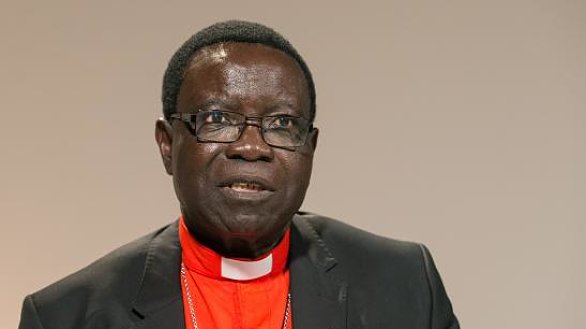African bishop focuses on evangelism, education and health care
By Heather Hahn*
NASHVILLE, Tenn. (UMNS)
Bishop Kasap Owan, a member of the Commission on UM Men, leads a growing part of The UMC, but with that growth comes great challenges.
Kasap, one of three new Congolese bishops elected in 2017, leads the South Congo Episcopal Area — which straddles his native Democratic Republic of Congo and its southern neighbor Zambia.
Massive area
Kasap presides over four annual conferences in Congo and one in Zambia. The central Africa area includes 52 districts, 1,045 pastors and more than 1.1 million church members. To put that in perspective, the U.S. North Central Jurisdiction — with nine bishops — has about 1.18 million members.
Most UMs in his area live on less than $2 a day, and they are contending with the aftermath of war or continuing factional violence.
“The church is growing in Congo first of all because people are poor and when people are suffering, they look to God to help them,” he said. “Secondly, Congo is a missionary country.”
Kasap and other Congolese believe the church, with God’s help, can relieve people’s suffering through evangelism and the promotion of social well-being.
He said, some Congolese churches preach the prosperity gospel, a faith that positive speech, and donations to religious causes will increase one's material wealth. Instead, he said, the UMC provides practical means toward prosperity such as providing education.
The UM commitment to educated clergy is especially important to Kasap. He has a Ph.D. in New Testament studies, and before his election as bishop, he served as president of Katanga Methodist University in Mulungushi. Six UM bishops, including Kasap, are among the university’s graduates.
Part of his heritage
Kasap’s ancestral roots in the church go back to Methodism’s arrival in Congo in 1912. That year, Methodist Episcopal Bishop John Springer approached a Congolese chief with plans of planting churches in the area. The chief persuaded the bishop to establish a much-needed hospital first, and then a church. That chief was Kasap’s grandfather.
In his own ministry, Kasap aims to carry on this family tradition of caring for both people’s spiritual and physical needs.
Three needs
Kasap identified three primary needs in his area: Evangelism, education and health care. Specifically, he said, his area needs help building and restoring churches in a part of the world where many United Methodists still hold services outdoors. He also wants help providing the sort of schooling he received as a youngster, and improving health care.
He spoke especially of the need to train and hire more doctors for the UM hospital in Kaponda, which has 250 beds but only two doctors.
Few roads
Even getting to health care is a challenge in Congo. The country — which is about the size of the U.S. east of the Mississippi River — has fewer paved roads than the state of Maryland.
In another part of Congo, North Katanga Episcopal Area has the “Wings of the Morning,” which flies people to receive medical care. Kasap would like to expand a smaller South Congo Wings of the Morning aviation ministry in his area.
To address these and other pressing needs, he has built relationships with the General Board of Global Ministries and a number of U.S. conferences, including New Mexico, Northwest Texas, Oklahoma and Pacific Northwest.
He also is working with “Bikes and Bibles,” coordinated by Joe Kilpatrick of the North Georgia Conference. That ministry provides motorcycles, bicycles and native-language Bibles across Africa.
“The bicycle is the horse of the circuit rider, and this is a circuit-rider economy,” Kilpatrick said. “This is where the United States was in the 1750s.”
Hope for the future
Despite his area’s many challenges, Kasap speaks with great hope for the work ahead.
“My hope is God,” he said. “If we have not confidence in God, we cannot do anything.”
He added that he also has hope in the UMC and the connections it provides.
“My hope is my partners,” he said. “You, my friends, can help us with the development of the church. The church is a change agent.”
*Hahn is a multimedia news reporter for United Methodist News Service.


